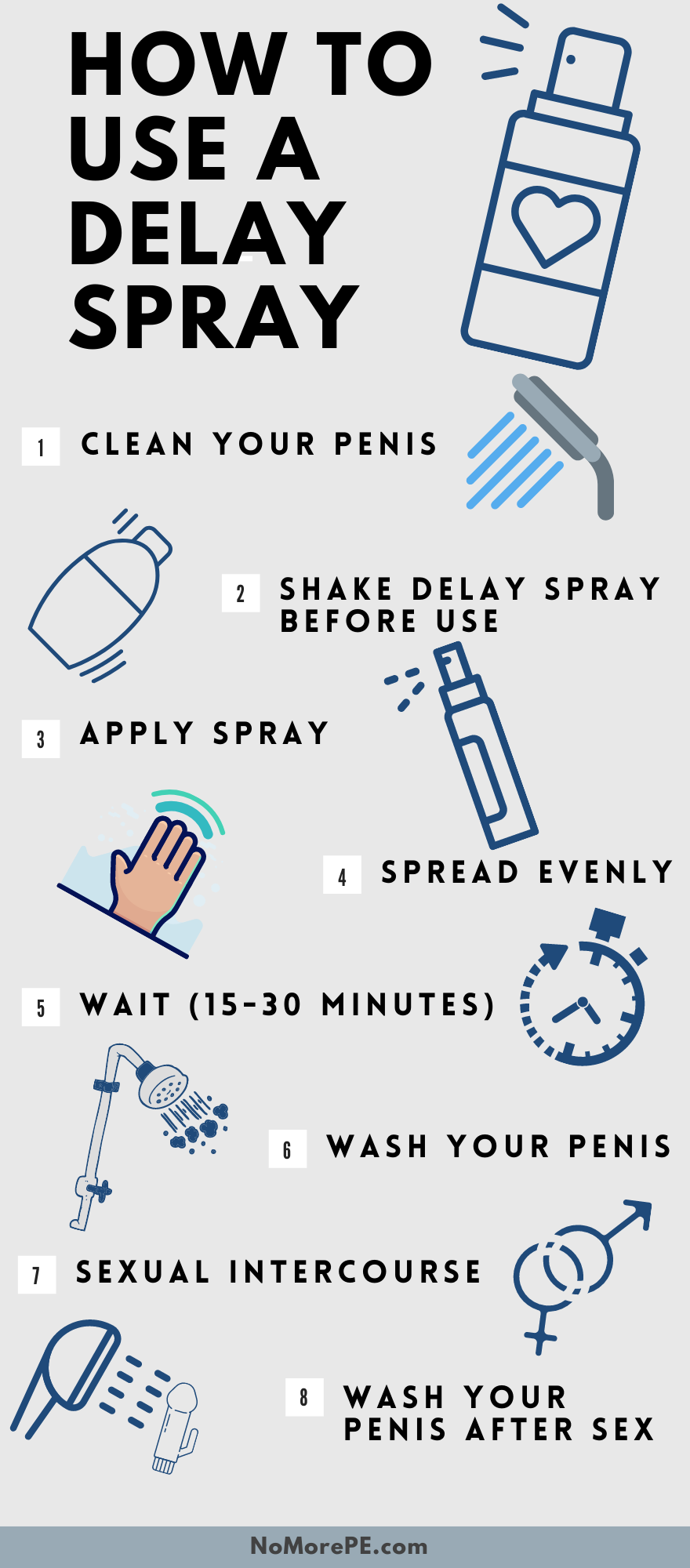Delay sprays are effective in treating premature ejaculation and help men with ejaculation issues last longer in bed. Delay sprays have topical anesthetics that include either benzocaine or lidocaine. The chances of passing the spray to your sex partner are very high during intercourse.
How does delay spray affect your sex partner and does delay spray affect pregnancy and sperm?
If you are using delay sprays for lasting longer in bed, you should know how it affects sperm and pregnancy.
Table of Contents
What Are Delay Sprays Made Of?
It is important to understand how delay sprays are made to better understand their impact on pregnancy.
Delay sprays contain topical anesthetic. The FDA has approved two local anesthetics for use in delay sprays:
- Lidocaine
- Benzocaine.
These topical anesthetics numb your penis which reduces its sensitivity. You can then last longer in bed with full control over ejaculation. Both lidocaine and benzocaine have side effects that include:
- Skin irritation
- Itching
- Redness
- Skin rash
- Burning
- Allergic reaction.
Benzocaine and lidocaine transfer to your partner’s vagina and make her numb. It is recommended to wash your penis with water before intercourse to avoid transmitting the delay spray to your partner.
Does Delay Spray Affect Pregnancy?
No, delay sprays don’t affect pregnancy. There is no scientific evidence that delay spray impacts pregnancy.
Topical lidocaine and benzocaine don’t affect pregnancy. All they can do is numb the vagina and its impact lasts around an hour. However, it is recommended to check the label of the delay spray or consult your doctor.
Promescent delay spray, for example, has clearly mentioned to ask your doctor before use if your partner is pregnant or expected to get pregnant. Instructions like these shouldn’t be ignored.
Generally, delay sprays don’t impact pregnancy and are considered safe to use.
However, you should avoid using delay sprays if you are trying to conceive as topical anesthetics might negatively impact sperm.
Does Delay Spray Affect Sperm?
Yes, delay spray may affect sperm and must be avoided when you are trying for conception. Multiple studies reported that using topical anesthetics on the penis negatively impacts sperm.
A study reported that a high concentration of lidocaine negatively impacts sperm motility (the moving speed of the sperm). Another study reported similar results where low concentration of lidocaine had no impact on sperm motility, but higher concentration reduced sperm motility.
A study on rats found that the use of lidocaine reduces sperm motility and might reduce the possibility of pregnancy.
These studies show that lidocaine has a negative impact on sperm motility which means it reduces their speed reducing the chances of getting pregnant.
Benzocaine, on the other hand, is generally considered safe for sperm motility as reported here. It doesn’t impact sperm health and male fertility. There are two possible reasons:
- Lidocaine is a stronger topical anesthetic than benzocaine. Being mild, benzocaine doesn’t impact sperm
- The scientific evidence on benzocaine and sperm health is limited. More studies will help us better understand the association.
Does Delay Spray Reduce the Possibility of Pregnancy?
Yes, delay sprays may reduce the chances of pregnancy and might delay conception. This is because lidocaine (the most common topical anesthetic used in delay sprays) is scientifically proven to negatively impact sperm motility.
Several studies reported that using a high concentration of lidocaine reduces sperm motility which is the ability of the sperm to move freely towards the egg inside the female reproductive tract. Low sperm motility means sperm can’t move freely and might find it hard to reach the egg leading to a low chance of egg fertilization.
Lidocaine is more likely to reduce sperm motility while benzocaine (a mild topical anesthetic used in delay sprays) isn’t scientifically proven to reduce sperm motility. If you want to conceive, prefer using a benzocaine delay spray.
How to Use Delay Sprays Safely?

If you are trying to conceive and can’t resist using a lidocaine delay spray, you must know how to use delay spray accurately to avoid hurting your fertility. A few precautionary steps can significantly lower the negative impact of lidocaine on sperm motility:
- Always follow the instructions on the label. If the spray says to avoid using it during pregnancy, don’t use it
- Avoid applying too many jets on your penis. A high concentration of lidocaine negatively impacts sperm whereas a low concentration is safe. More spray means a high concentration of lidocaine. A simple rule is to follow the instructions on the delay spray that tells you the maximum number of sprays you can use per 24 hours. According to the FDA, you shouldn’t use more than 10 sprays on your penis to avoid complications
- Wash your penis after applying the delay spray on your penis. Once you have applied the spray on your penis, give it 5-10 minutes for absorption and then wash your penis with water. This will significantly lower its impact on your sperm and avoid pregnancy-related issues
- Stick with low doses of the delay spray. A good idea is to use 3 sprays. This keeps the lidocaine concentration low
- Do not use delay spray multiple times in a single day. If you have to do intercourse multiple times a day, make sure the total number of sprays in 24 hours shouldn’t exceed 10.
FAQs
Here are the most asked questions and their answers on the effect of delay spray on pregnancy:
Can We Use Delay Spray During Pregnancy?
Due to a lack of scientific evidence, delay sprays are considered safe during pregnancy. However, you should consult the product label and your doctor before using any delay spray during pregnancy.
Topical anesthetics (the main ingredients used in delay sprays) have no association with pregnancy and don’t impact pregnant women. If you plan to use delay sprays during pregnancy, always wash your penis and remove spray residue before intercourse.
Does Delay Spray Affect the Woman?
The only way a delay spray can affect a woman is by transferring to the vagina and making her numb. There are no other known effects of delay sprays on women. The chances of passing the numbing effect to the vagina can be reduced significantly by washing your penis before penetration.
Can I Use Delay Spray Every Day?
Yes, you can use delay spray daily as long as you follow certain rules. Don’t use more than 10 sprays in a single day. Exceeding 10 sprays increases the concentration of the topical anesthetic which has a negative impact on sperm health. Follow the instructions on the label and don’t exceed 10 sprays in a single go as recommended by the FDA.
Does Lidocaine Spray Affect Sperm?
Yes, a high concentration of lidocaine spray negatively impacts sperm’s ability to move freely towards the egg. A high concentration of lidocaine delay spray is reported to negatively impact sperm health. And this reduces the chances of pregnancy.
However, lidocaine is safe when used in low concentrations. Follow the instructions on the label and don’t exceed 10 sprays to stay safe.
Does Delay Spray Affect Your Partner?
Delay sprays only affect your partner when the spray is transmitted to their genitals. In this case, the numbness will be passed to your partner. Numbness reduces sensitivity and your partner will take much longer to ejaculate.
There is no other way delay spray affects your partner.
Final Words
Delay sprays, generally, don’t have any impact on pregnancy and are safe to use during pregnancy. It is a good idea to consult a doctor before using delay spray during pregnancy.
If you want to conceive, using delay sprays isn’t a good idea, especially lidocaine delay sprays. Lidocaine delay spray negatively impacts sperm motility and makes it hard to get pregnant as sperm can’t move to the egg freely.
Therefore, you should avoid using a delay spray when interested in pregnancy.
Use the precautionary steps shared in this article to minimize the impact of delay spray on your partner, sperm, and pregnancy.
Updated: May 17, 2023

